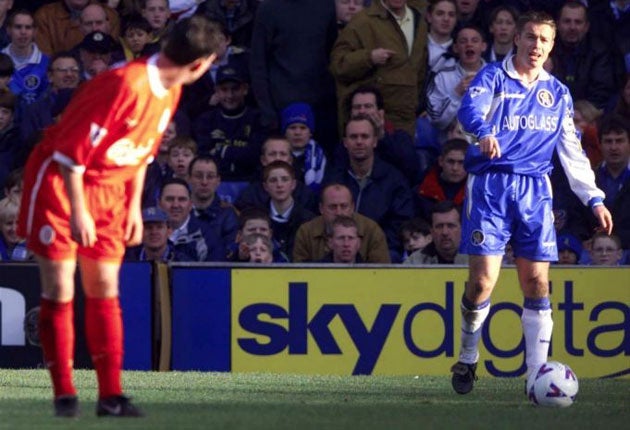Gay players: the truth football won't face
As the FA is forced to shelve its campaign against homophobia, Ian Herbert asks why stars are too timid to tackle this taboo

Your support helps us to tell the story
From reproductive rights to climate change to Big Tech, The Independent is on the ground when the story is developing. Whether it's investigating the financials of Elon Musk's pro-Trump PAC or producing our latest documentary, 'The A Word', which shines a light on the American women fighting for reproductive rights, we know how important it is to parse out the facts from the messaging.
At such a critical moment in US history, we need reporters on the ground. Your donation allows us to keep sending journalists to speak to both sides of the story.
The Independent is trusted by Americans across the entire political spectrum. And unlike many other quality news outlets, we choose not to lock Americans out of our reporting and analysis with paywalls. We believe quality journalism should be available to everyone, paid for by those who can afford it.
Your support makes all the difference.Rio Ferdinand, a player whose use of the word "faggot" on Chris Moyles' Radio 1 show hardly endeared him to those in gay circles a few years back, has become an improbable name in the drive against homophobia in football. After England's Emile Heskey was subjected to serious racist abuse by a crowd in Zagreb in the autumn of 2008 and the Croatian Football Association were fined a derisory sum, Ferdinand retorted: "What good is that going to do? That is not going to stop people shouting racist or homophobic abuse."
Since homophobia barely seems to exist in the football lexicon, that mere passing nod to the word carried some significance at the time, though player recognition of one of the last taboos of the game rapidly vanished once again when it came to producing a video to campaign against it. The film was to have been broadcast on YouTube as part of a viral internet campaign and shown by clubs on stadium screens during half-time. Attempts to involve players in the video project, which the Kick it Out organisation initiated at the end of January 2008 and put out to tender to marketing agencies nine months later, were certainly imaginative. The literature designed by the Ogilvy agency took the form of mini-sales documents, informing players and their agents of the image value of being associated with a campaign to drive bigotry from the game. As one individual close to the project said yesterday: "It's a commercial world and we tried to talk their language."
But sometimes money just can't talk. Culturally, football has changed little from the day at Stamford Bridge in 1999 when Robbie Fowler's notorious touchline gesture at Graeme Le Saux revealed what can follow for those who, in Le Saux's case, happen to read a broadsheet newspaper. The former England player's autobiography paints an unsparing and depressing picture, incidentally, of all the other taunts too: Robbie Savage and Paul Ince do not emerge with any credit.
This is what the Professional Footballers' Association knew they were up against when Ogilvy talked about using players, though the project has been bedevilled with other problems. Initial delays were caused by the departure of the Football Association's equality manager and the wait to recruit a successor, though once that was cleared there was hope that approaching players in the last close season might elicit some success.
A month of canvassing brought no response and Ogilvy settled instead for the hard-hitting script featuring a homophobe at work, which can be viewed today on the Independent's website. The film's script was shown to the FA, Stonewall, Kick it Out and the PFA, and agreed on, clearing the way for filming by Walter Stern, known for his video work with bands such as the Chemical Brothers and Manic Street Preachers and also an award-winning director of commercials. So convinced were Kick it Out last week that the video was finally on course for launch that the email invitations had been sent out for the event at Wembley later this month. Then the FA decided that more consultation was required.
The gay activist Peter Tatchell believes that the FA simply lacked the courage to follow through on its commitment when it saw how edgy the film was. "They were scared it would be seen as offensive and didn't have the courage to justify their initial decision to pursue the idea," he said. Tatchell, one of the originators of the idea, has always preferred a light-hearted MTV-style film, featuring music and footballers, though he supported the script when something very different was pursued. Tatchell also argues that the FA should have done far more to drive the pursuit of players for the video, which was left to the PFA.
The FA's ability to make progress with the video seems to have been affected by the decision to dissolve its anti-homophobia working group and recruit for new members of a more broadly-based, reconstituted group. The first meeting of the new group takes place next month. The FA insisted last night that it needed more time for consultation on the strategy before it could launch the video, though the last-minute cancellation has actually provided a launch of its own.
These complications are hardly a source of encouragement to those straight players tempted to speak out, let alone those who are gay. "Everyone always talks about the success of the anti-racism campaign but that worked because our members could create the movement themselves," a senior PFA executive said last night. "The push for the anti-homophobia campaign is external to us." It was an apposite observation. Gay footballers are the outsiders, and will probably be so for some time to come.
Join our commenting forum
Join thought-provoking conversations, follow other Independent readers and see their replies
Comments